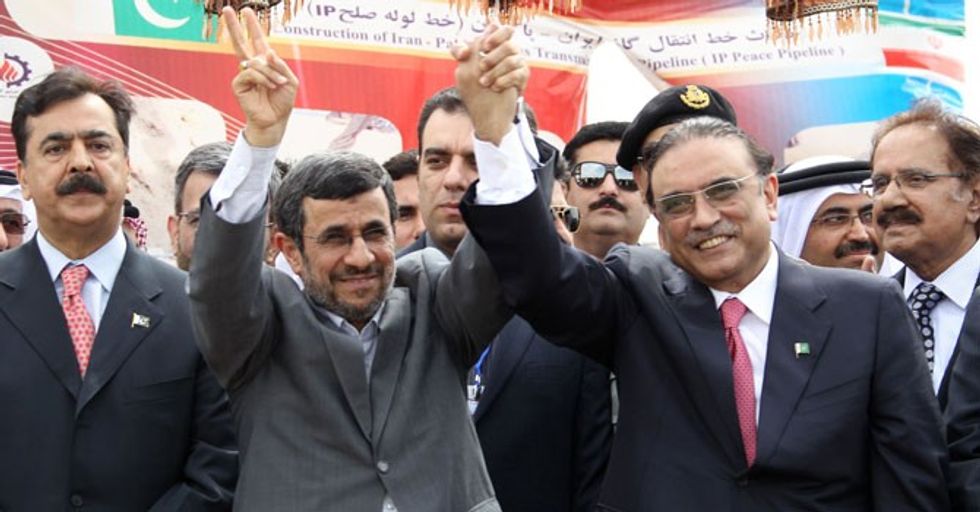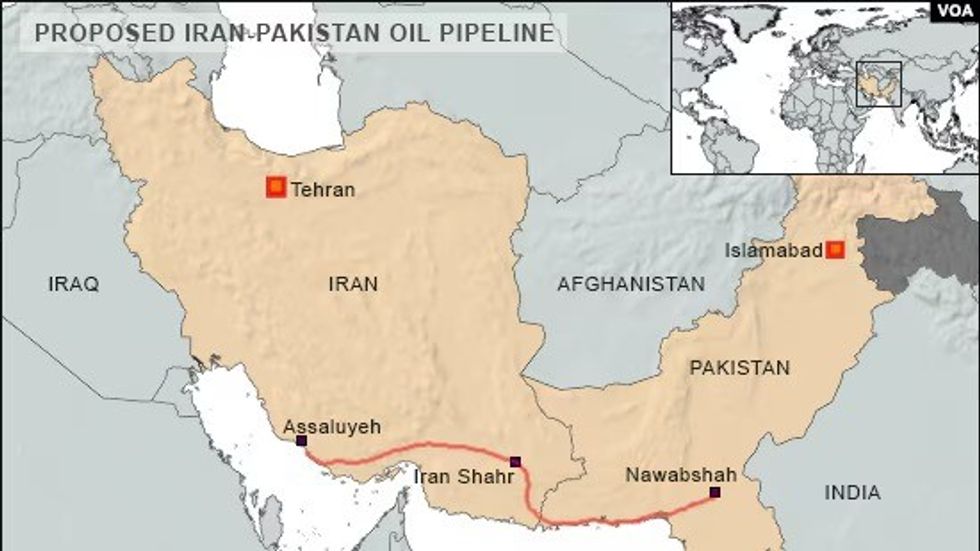Iran-Pakistan gas pipeline: What’s at stake and why the US cares
Tehran has warned it may take legal action against Islamabad for failing to complete pipeline project, a move hindered by U.S. sanctions

Zain Ul Abideen
Senior Producer
Zain Ul Abideen is an experienced digital journalist with over 12 years in the media industry, having held key editorial positions at top news organizations in Pakistan.

Iranians work on a section of a gas pipeline linking Iran and Pakistan after the project was launched during a ceremony in the Iranian border city of Chah Bahar on March 11, 2013.
AFP
The 2010 deal envisages supply of 750 million to a billion cubic feet per day of natural gas to Pakistan
Deal also originally involved extending the pipeline to India, but New Delhi later dropped out of the project
The United States has reaffirmed its opposition to the Iran-Pakistan gas pipeline project, warning of potential sanctions risks for businesses engaging with Tehran.
“So what I’ll say is that we will continue to enforce our sanctions against Iran. And as a matter of course, we also advise anyone considering business deals with Iran to be aware of the potential ramifications of those deals,” Matthew Miller, the spokesperson for the U.S. Department of State, said during a press briefing in Washington.
“At the same time, helping Pakistan address its energy shortage is a priority for the United States, and we continue to discuss energy security with the government of Pakistan.”
The significance of the Iran-Pakistan gas pipeline, also known as the Peace Pipeline, and the reasons behind its controversy are central to understanding the current dispute. Here’s a closer look at the project and why it has become such a contentious issue.
Why is it important?
The pipeline deal, signed in 2010, envisaged the supply of 750 million to a billion cubic feet per day of natural gas for 25 years from Iran's South Pars gas field to Pakistan to meet Pakistan's rising energy needs.
The pipeline was to stretch over 1,900 kilometers (1,180 miles) - 1,150 km within Iran and 781 km within Pakistan.
Tehran said it has already invested $2 billion to construct the pipeline on its side of the border, making it ready to export. Pakistan, however, did not begin construction and shortly after the deal said the project was off the table for the time being, citing international sanctions on Iran as the reason.
Iran's oil minister at the time responded that Iran had carried out its commitments and expected Pakistan to honor its own. He urged Pakistan to pick up the pace of work.
In 2014, Pakistan asked for a 10-year extension to build the pipeline, which expires in September this year. Iran can take Pakistan to international court and fine the country. Local media reported that Pakistan can be fined up to $18 billion for not holding up its half of the agreement.

Faced with a potential fine, Pakistan's caretaker administration gave the go-ahead in principle to commence plans to build an 80 km pipeline segment.
In March, Islamabad said it would seek a U.S. sanctions waiver for the pipeline. However, later that week, the U.S. publicly said it did not support the project and cautioned about the risk of sanctions in doing business with Tehran.
Washington's support is crucial for Pakistan as the country looks to sign a new longer-term bailout program with the International Monetary Fund (IMF) in the coming weeks.
Pakistan, whose domestic and industrial users rely on natural gas for heating and energy needs, is in dire need of cheap gas as its reserves dwindle fast, and LNG deals make supplies expensive amidst high inflation.
Iran has the world's second-largest gas reserves after Russia, according to BP's Statistical Review of World Energy. However, sanctions by the West, political turmoil, and construction delays have slowed its development as an exporter.
Originally, the deal also involved extending the pipeline to India, but New Delhi later dropped out of the project.
Can Pakistan persuade US to provide a waiver?
The crucial question is how Pakistan intends to persuade the United States to provide a waiver for the construction of the gas pipeline. Pakistan doesn’t appear to have many options for talks with the U.S. It currently has little influence over Washington.
During a congressional hearing, Donald Lu, the U.S. assistant secretary of state for South and Central Asia, stated that the department was keeping an eye on the proposed pipeline between Iran and Pakistan.
“We have also not heard from the government of Pakistan [on a] desire for any waiver for American sanctions that would certainly result from such a project,” Lu stated.

Lu also informed the committee that Pakistan would find it difficult to secure funding for the project: “I don’t think many international donors will be interested in funding such an endeavor.”
It is obvious that the U.S. opposes Pakistan constructing the pipeline, but it remains to be seen if Pakistan can persuade Washington to provide a waiver through lobbying and other means. In any event, Pakistan faces a difficult task in trying to persuade the U.S. that this project might benefit everyone while avoiding penalties from Iran.
What options does Iran have?
In response to the U.S. sanctions, Tehran is increasingly aligning with Moscow. In July 2022, Russian energy giant Gazprom signed a $40 billion cooperation agreement with the National Iranian Oil Company (NIOC). Under the deal, Gazprom is set to assist NIOC in developing two gas fields and six oil fields.
Observers suggest that Iran's prospects for winning a legal battle against Pakistan are slim. Pakistani journalist Sabena Siddiqi, an expert in foreign policy, notes that Tehran might take its case to the United Nations Commission on International Trade Law in Vienna.
However, she points out, "Given the unstable regional situation, the ongoing war in Gaza, and Iran's involvement in various crises, it is highly unlikely that Washington would allow Iran to prevail in this case." Instead, she adds, "The U.S. may offer Pakistan alternative options to address its energy security needs."







Comments
See what people are discussing